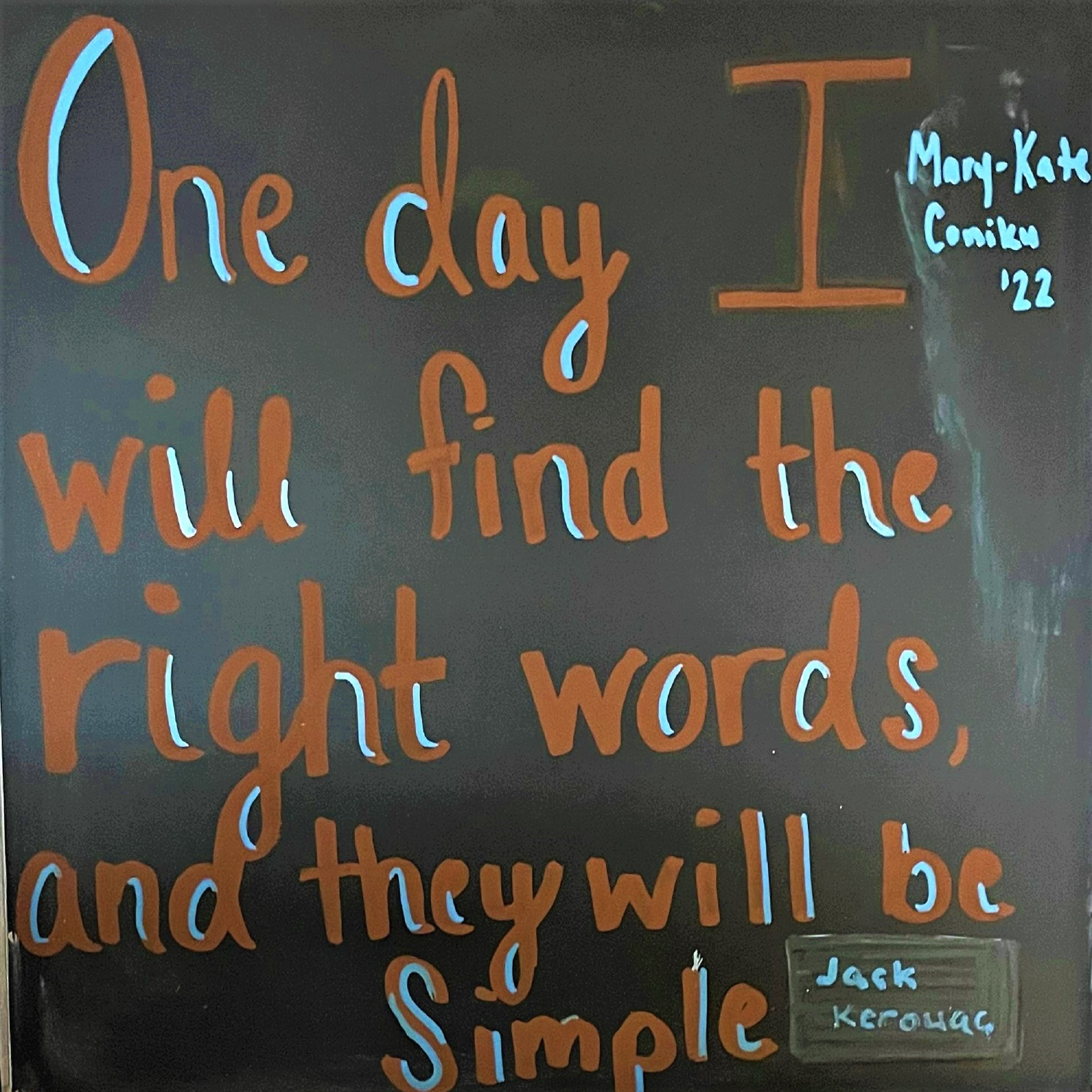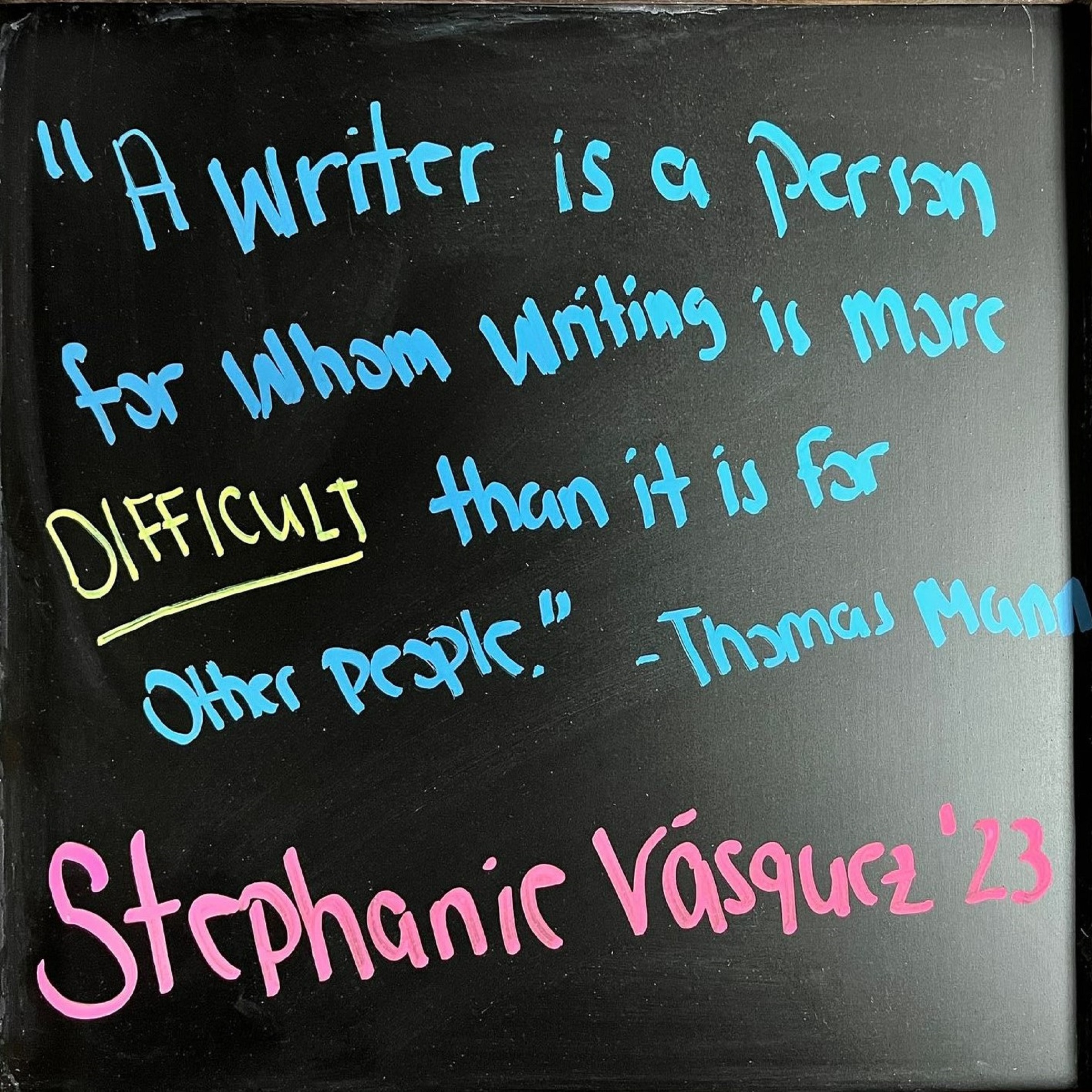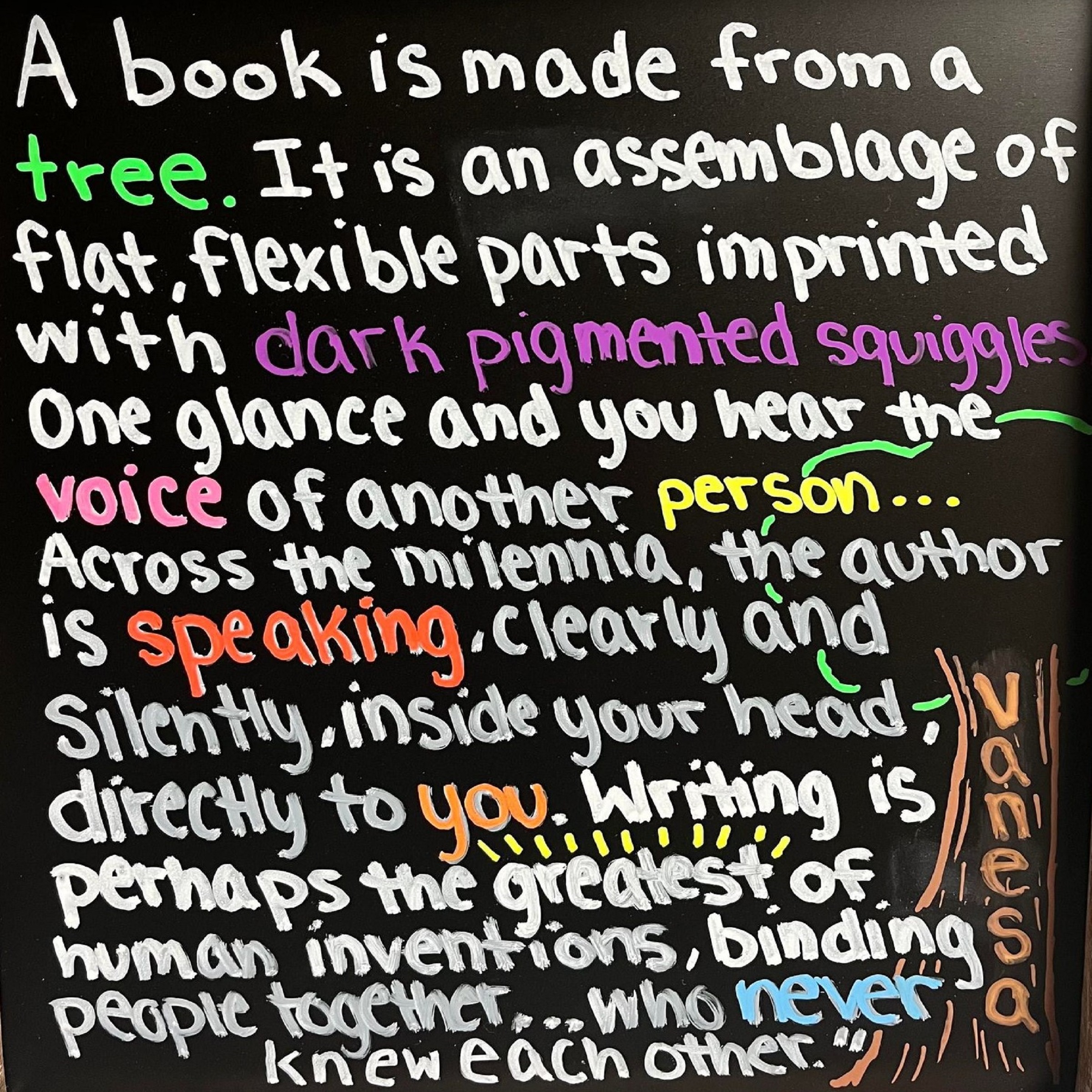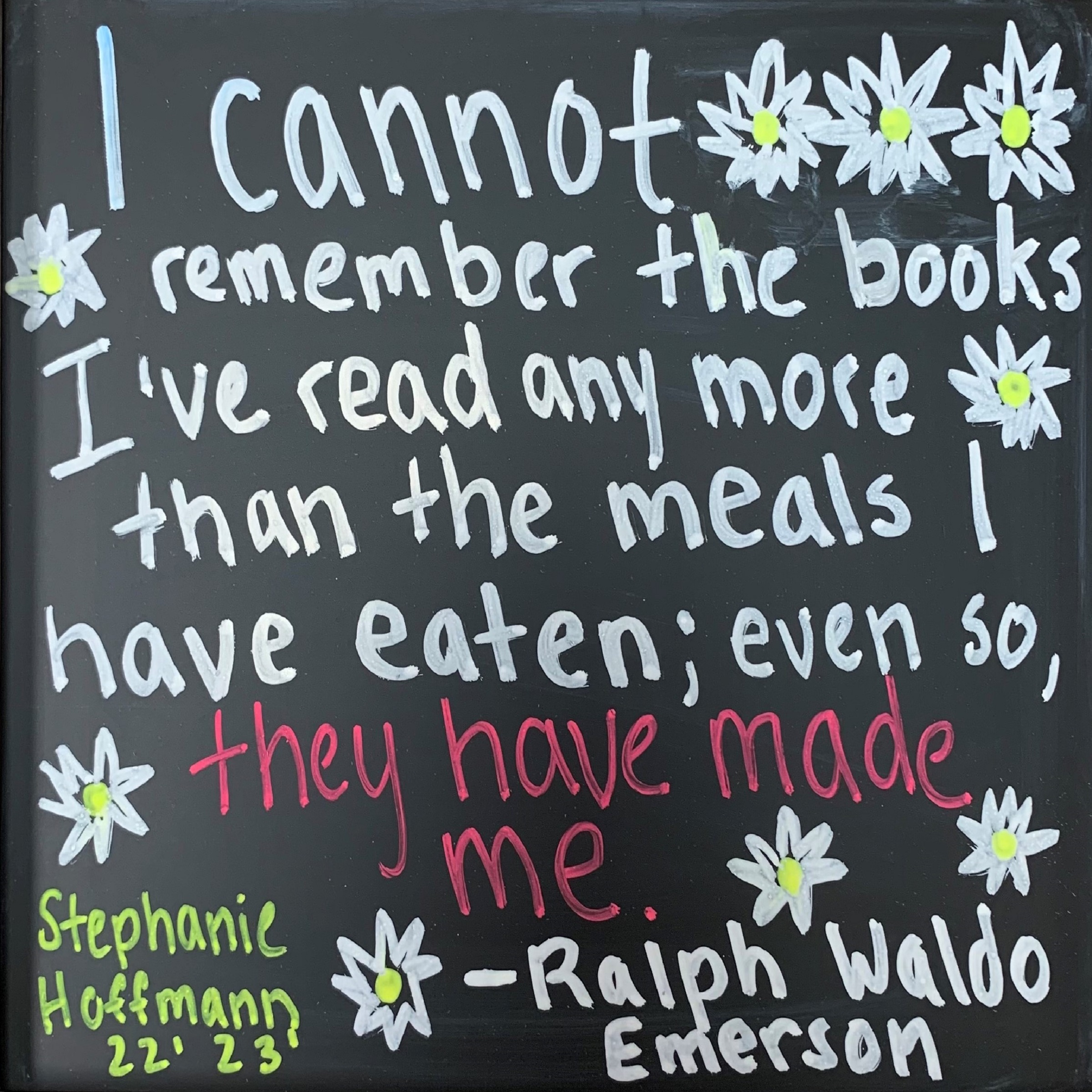A Love Letter to New Tutors
by Senior Writing Tutor Bethany Belkowski
January 2024
Dear New Tutor,
I’ve been told love letters are a thing of the past, but I’m a hopeless romantic and a writing tutor, so there is simply no way you aren’t receiving a love letter from me the semester before I graduate.
First and foremost, welcome aboard! The team is so lucky to have you! You are beginning a journey down a fruitful and fulfilling path. However, like many of us, you likely have some doubts. Many talented student writers, who usually double as readers, may adhere to the classic writer/reader stereotypes of innate introversion and bookish behavior, which may generate reservations about our own reserved personalities. Other new tutors may simply experience discomfort in taking on a teaching role. Either way, I hope to offer some relief to those of you nervous to take on this incredible role.
For us naturally shy tutors, our introversion can feel like a chronic condition. In actuality, it’s not a condition at all. It’s just a personality trait—and, in some situations, a powerful tool. But, to use our introverted personalities as a tool, we must first have some confidence in ourselves. For those with pre-session jitters, I recommend showing up a few minutes earlier than you would otherwise. Those few extra minutes will allow you to settle into the Writing Center space and look over any client appointment forms before a student actually arrives. Take this time to get comfortable and calm.
Once your appointment arrives, remember that each student is your peer. Your conversations do not have to be overly formal. You do not have to be a professor giving a lecture. Treat students like your friends. As long as you can convey knowledge and provide helpful comments, there is no reason to restrict your diction to the tight bounds of formality. Plus, with a more casual tone, it will likely make students feel more comfortable, which, more often than not, also helps put you at ease.
It’s also important to remember that most students come to the Writing Center to learn, or they reluctantly make an appearance
to appease a professor. Either way, you, as a tutor, have an immediate advantage. You are in the Writing Center because you chose to be. You’re in the Writing Center because you want to be. Your passion automatically gives you an edge. With that in mind, recognize that a space like the Writing Center will likely act as a space of comfort for you. Enjoy it and draw on your own experiences of discomfort to better understand what your student may be feeling and how you can best help them relax. A more relaxed tutee makes for a more relaxed tutor!
However, despite tutoring in what may be a comfortable space, I still found it difficult to converse with students, especially more reserved ones (because then there’s just two introverts staring and nodding at each other, playing a game of chicken and waiting for the other to speak first). In situations like this, although it may seem a bit excessive, it may help to prepare a few “small-talk templates,” or a list of potential questions/topics to spur conversation with your tutee. In my moments of anxiety, I tend to fall back on the same three greetings/preliminary conversations, but it works. As you get more comfortable, the formula will likely fade, but it’s never a bad thing to have in your back pocket!
Yet, the previous paragraph isn’t to say that silence is the nightmare situation. In fact, it may be a very beneficial situation. This is the part where I reveal how your potential introversion is a powerful tool. Ironically, a lack of words can actually assist you in your work at the Writing Center. While being an extroverted people-person can make it easier to chat with tutees and generate dynamic discussions, it is also crucial not to dominate conversations. A more reserved personality may make it easier to ensure tutees not only ask questions, but provide their own input when rewriting and revising. The thoughts and feelings of a tutee should never be left unsaid. You simply cannot do your job without them!
Lastly, many new tutors find themselves afflicted with imposter syndrome, but I assure you this should be the least of your worries. Yet, if there is any doubt, just remember that you were hired for a reason. You earned this position and you are most definitely qualified. You won’t know the answer to every
question. It’s simply not possible. As a tutor, part of your job is learning. There’s no shame in walking across the hall or around the corner to ask your coordinator a question. And if all else fails, the world wide web is a wonderful place. With our own personalized “thinking boxes,” at our fingertips we can always ask Google or reference trusted resources! Just share what you know and recognize that it’s okay to not have the right words for every situation. Most of all, it’s okay to mess up. A vast majority of tutees won’t even realize you “messed up.” Other tutors may not even consider it a “mess up.” We are our own worst critics, and we can only really learn through doing what we were hired to do. Practice, practice, practice.
I leave you with my most sincere congratulations on your acceptance of this position. I am confident you will make a great tutor. And in the wise words of our good friend Ignatius, “Go forth and set the world on fire!”
All the best (and most certainly with love),
A fellow tutor

Put the PEER in PEER Tutoring
by Senior Writing Tutor Eamonn Wizeman
2/1/24
Confidence in yourself is a key to successfully working any job. However, this can be a difficult trait for new employees to learn. It is especially difficult for young workers, and in the writing center, there is an additional layer of challenge due to the interaction it requires with fellow students. This interaction between the tutor and the student is integral to completing a session, and speaking with confidence is key to making sure that the relationship is healthy. While this may be difficult, it is important to remember that confidence comes with time. However, there may be a few tips I can offer to help new tutors feel more comfortable and confident in themselves.
As a new tutor, you may feel that you cannot act like yourself, or that you must put on a different persona to effectively conduct a session. The reality is that you need to act in a way in which you are both comfortable and able to offer suggestions to the student, which is almost always you acting how you normally act: as yourself. When you are not worried about putting up a fake front to convince the student of something, you can dedicate more focus to the task at hand. The key here is relaxing. You earned the job for a reason, you are qualified, and all you need to show the student is how to improve their paper.
While this may be difficult, you can employ some tactics to ease into a session. What I have always done is to try and remember that the student is coming to you for help, which most likely makes them feel vulnerable to criticism from someone they do not know. As tutors, we are obligated to understand this and handle it with grace. If someone is willing to come to us vulnerably, it is an honor to be able to help them. For me, remembering this is key. It is why we do what we do, and it is why acting like yourself and not like a professor is so important. Someone asking for help does not want to have to deal with someone reminiscent of their professor, as they would most likely ask their professor for help if they were comfortable with it. Being yourself and acting as a peer is what will make them the most comfortable, and by being yourself you will feel most comfortable, whilst also portraying confidence and clarity.
How to Use the Environment to Enhance Your Writing Sessions
by Graduate Student Writing Tutor Danielle DePasquale
4/4/2024
For those of you who don’t know me, my name is Danielle DePasquale. I have worked at the Writing Center for the entirety of my undergraduate and graduate career at the University of Scranton. This might be aging myself, but that’s pre– and post-pandemic. I created this resource to guide future consultants based on what I’ve learned . Here’s a quick orientation to the Writing Center Office, so that you can learn your environment to help the writers you work with navigate the tools and resources we provide. I hope this information will help you use our snug space to your advantage.
So, you’ve made it to LSC 582. Congratulations! Finding our office is almost always the most difficult part. All jokes aside, our space provides an open layout that is warm and welcoming to student writers.
Before you even start a session, there are ways to optimize the physical environment and space you are working in:
- The first thing students will see when they enter the office are the small whiteboards hung outside of each room. I suggest picking a bright-colored dry-erase marker and writing your name on the whiteboard outside of the room you will be using; this is a personalized way of inviting your writer into the session and helps them confidently locate their consultant.
- Make sure that there is optimal lighting; there are additional lamps available in some of the rooms to increase brightness. In addition, adjusting the room to a comfortable temperature can help to increase alertness. Regarding noise level, there is a white noise machine in the center room that can be used to mitigate some of the noise coming from other sessions and/or surrounding offices.
- Once you as a consultant have settled into the space, it is important to consider how you are positioned when a writer approaches you. I advise facing towards the doorway so that you can greet the student upon their arrival; this is especially important for a first-time session. Offering different seating options is another way to cater to the needs of your writer. For example, some may find it more comfortable to sit across from you, while others prefer to sit next to you. The tables in each room provide ample space to organize laptops, packets, books, folders, etc. It is also important to consider what learning format will work best for students.
- Some students benefit from working off of their laptops while you simultaneously review a copy of their paper on yours. Others like to work off of one screen at a time and prefer that you both use their laptop. If a student does not bring or own a laptop, you can work on your laptop; we also have two additional computers in our office. Email or upload a copy of what you discussed during your session for the student to review. Other times, students will bring in a physical copy of their paper. I have found it effective to have them use a different colored pen or pencil to make notes on their paper. You can do this in collaboration with the student, or they may feel more comfortable making the notes for themselves to review at a later time.
- Each room is also equipped with a large whiteboard. I have often used these whiteboards to provide visual examples of citations and sentence structure or to simply brainstorm ideas with a student. You can also draw on the white boards or post inspirational phrases to make the space more inviting.
- Recently,, we have equipped our space with fidget bins. Studies have shown that fidgeting with an object in the hand helps students to stay focused when doing a long task or sitting still and attentive in a long meeting. Fidgets not only increase attention but can also work as a stress management tool. Keep a fidget bin on the desk where you are working. If they are within reach, students are more likely to use them. Writing a paper or using our services for the first time may be a nerve-wracking experience for some students. I found that allowing students to use these small, quiet, discrete items helps them concentrate better during sessions.
- If it’s a student’s first time in the writing center, be sure to orient them to the office. Give them a trendy new pencil and direct them toward our wall of printed resources. We offer many packets, graphic organizers, and other tools that help guide the writing process. These resources can be provided to students to keep or for you with them during a session. We also have access to books and manuals that can be located on shelves throughout the office; these books and manuals are especially helpful when formatting and citation questions arise.
- At the end of a session, it is important to bring a student’s awareness to the “Tell Us About Your Session” QR code magnet that is hung up in every office. Encouraging students to fill out our student feedback survey after each session helps us keep track of the effectiveness of our services and identify ways to maintain or improve future services. O
Overall, providing opportunities for choice and collaboration is key. It’s important to remember that our role is to guide students to the best of our abilities. To enhance the experience for our writers, I want to bring your attention to various tools located within the writing center office that can be used to best support your writer’s needs during an appointment. These strategies I shared will help you create an atmosphere conducive to learning and set your writer up for success.













